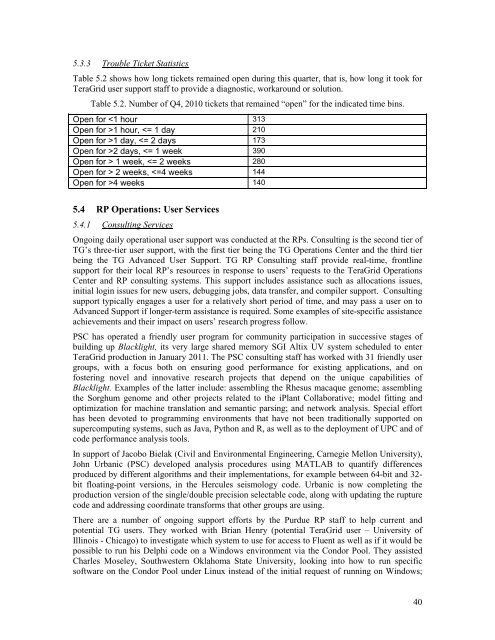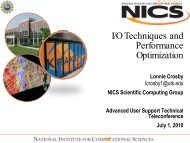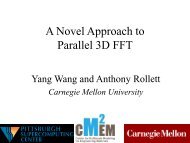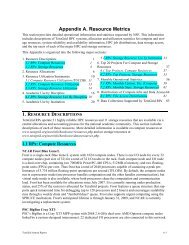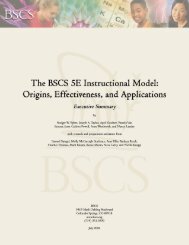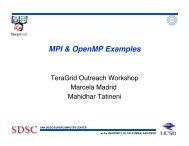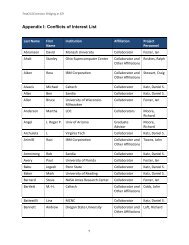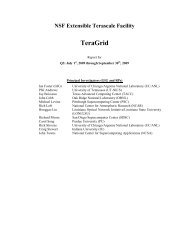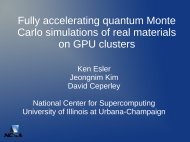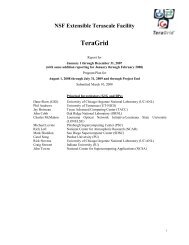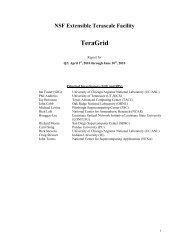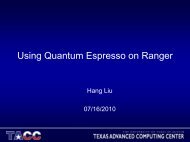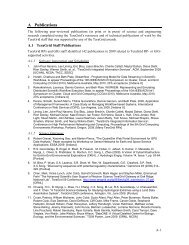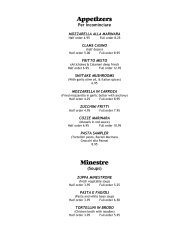TGQR 2010Q4 Report.pdf - Teragridforum.org
TGQR 2010Q4 Report.pdf - Teragridforum.org
TGQR 2010Q4 Report.pdf - Teragridforum.org
Create successful ePaper yourself
Turn your PDF publications into a flip-book with our unique Google optimized e-Paper software.
5.3.3<br />
Trouble Ticket Statistics<br />
Table 5.2 shows how long tickets remained open during this quarter, that is, how long it took for<br />
TeraGrid user support staff to provide a diagnostic, workaround or solution.<br />
Table 5.2. Number of Q4, 2010 tickets that remained “open” for the indicated time bins.<br />
Open for 1 hour, 1 day, 2 days, 1 week, 2 weeks, 4 weeks 140<br />
5.4 RP Operations: User Services<br />
5.4.1<br />
Consulting Services<br />
Ongoing daily operational user support was conducted at the RPs. Consulting is the second tier of<br />
TG’s three-tier user support, with the first tier being the TG Operations Center and the third tier<br />
being the TG Advanced User Support. TG RP Consulting staff provide real-time, frontline<br />
support for their local RP’s resources in response to users’ requests to the TeraGrid Operations<br />
Center and RP consulting systems. This support includes assistance such as allocations issues,<br />
initial login issues for new users, debugging jobs, data transfer, and compiler support. Consulting<br />
support typically engages a user for a relatively short period of time, and may pass a user on to<br />
Advanced Support if longer-term assistance is required. Some examples of site-specific assistance<br />
achievements and their impact on users’ research progress follow.<br />
PSC has operated a friendly user program for community participation in successive stages of<br />
building up Blacklight, its very large shared memory SGI Altix UV system scheduled to enter<br />
TeraGrid production in January 2011. The PSC consulting staff has worked with 31 friendly user<br />
groups, with a focus both on ensuring good performance for existing applications, and on<br />
fostering novel and innovative research projects that depend on the unique capabilities of<br />
Blacklight. Examples of the latter include: assembling the Rhesus macaque genome; assembling<br />
the S<strong>org</strong>hum genome and other projects related to the iPlant Collaborative; model fitting and<br />
optimization for machine translation and semantic parsing; and network analysis. Special effort<br />
has been devoted to programming environments that have not been traditionally supported on<br />
supercomputing systems, such as Java, Python and R, as well as to the deployment of UPC and of<br />
code performance analysis tools.<br />
In support of Jacobo Bielak (Civil and Environmental Engineering, Carnegie Mellon University),<br />
John Urbanic (PSC) developed analysis procedures using MATLAB to quantify differences<br />
produced by different algorithms and their implementations, for example between 64-bit and 32-<br />
bit floating-point versions, in the Hercules seismology code. Urbanic is now completing the<br />
production version of the single/double precision selectable code, along with updating the rupture<br />
code and addressing coordinate transforms that other groups are using.<br />
There are a number of ongoing support efforts by the Purdue RP staff to help current and<br />
potential TG users. They worked with Brian Henry (potential TeraGrid user – University of<br />
Illinois - Chicago) to investigate which system to use for access to Fluent as well as if it would be<br />
possible to run his Delphi code on a Windows environment via the Condor Pool. They assisted<br />
Charles Moseley, Southwestern Oklahoma State University, looking into how to run specific<br />
software on the Condor Pool under Linux instead of the initial request of running on Windows;<br />
40


